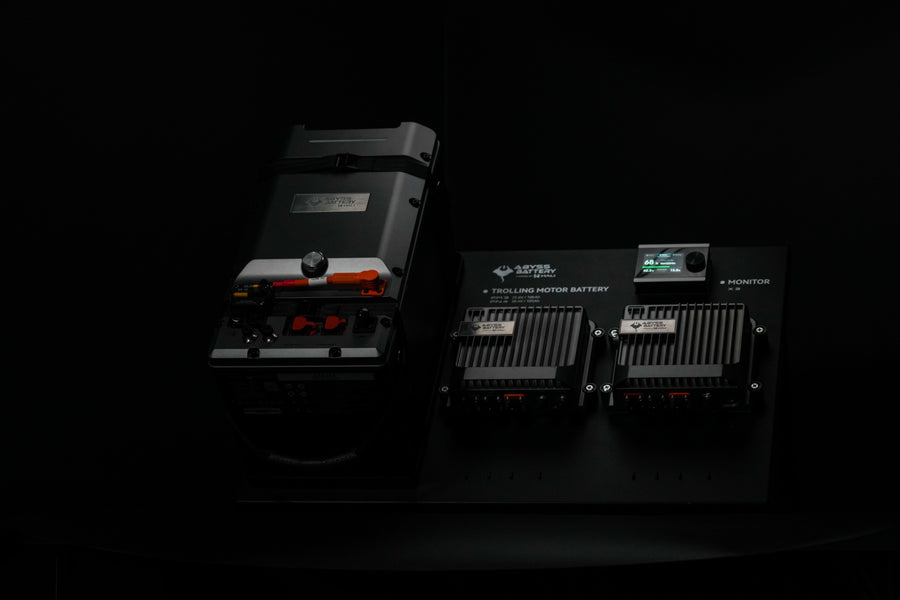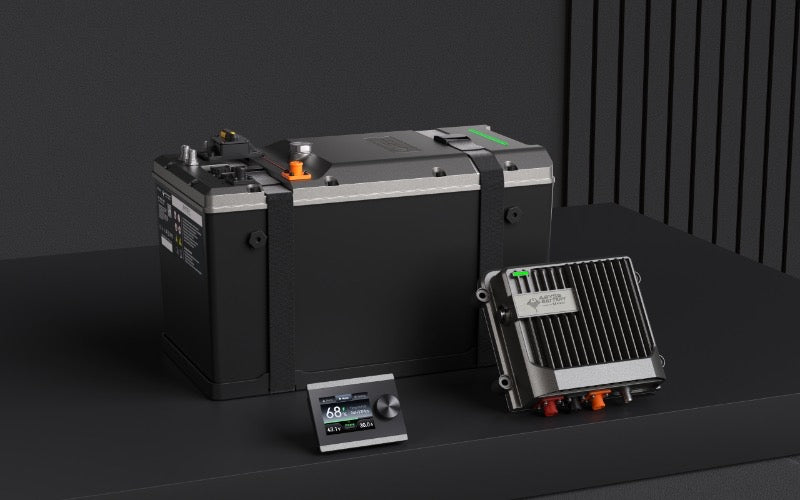Safety Tips for Handling and Maintaining Lithium Marine Batteries

Boating aficionados understand well the role that a reliable battery plays in their adventures. Recent advances in marine battery technology, particularly in the realm of lithium-ion batteries, have transformed the way we power our vessels, offering benefits that improve safety, efficiency, and sustainability. But just like any other batteries, these modern power solutions demand proper care.
Learn more about lithium marine battery safety, including handling, charging, and storage. We’ll help you power through one adventure at a time.
Setting the Course: Why Lithium Marine Batteries Require Special Care
The transition from lead-acid to lithium batteries represents a significant leap forward in marine technology. Lithium-ion boat batteries are inherently safer than traditional lead-acid configurations, with features like safety valves and thermal shutdown mechanisms that diminish the risk of explosion or electrolyte spills. They are also less prone to sulfation and corrosion that can occur with lead-acid varieties.
Since they are significantly more compact than lead-acid batteries, lithium batteries offer better weight distribution, resulting in a smoother, more fuel-efficient ride. They can maintain a consistent power output throughout the discharge cycle, avoiding the common pitfall of voltage drop that can affect the operation of onboard electronics.
Challenges That Impact Lithium Battery Safety and Performance
Lithium batteries face harsh conditions that can affect battery cells and connections over time. These include:
- Constant vibration and shock: Continuous stress events like vibration and shock can crack cells and loosen connections.
- Corrosive properties: High humidity and salt spray threaten the corrosion of battery pack enclosures, often causing cracks that result in leakage and short circuits.
- Temperature swings: From icy waters to elevated heat, temperature variations can either make batteries sluggish or speed up cell aging.
Lithium-Ion Battery Care for Peace of Mind in Every Adventure
Properly handling lithium marine batteries requires a blend of diligence and best practices. Errors can lead to chemical exposure, fire, or even explosions. Whether you’re a boat owner, a marine enthusiast, or part of the eco-conscious community, safe handling of boat batteries is key to an enjoyable boating experience. Ensure optimal performance, safety, and long-lasting power.
Know the Technicalities
Battery management systems (BMS) are the guardians of your lithium batteries, helping you monitor the battery’s condition while managing the charge and discharge processes to prevent overcharging or over-discharging. Operate within the recommended temperature range to keep the batteries and everyone onboard safe.
Handle With Care
Always handle lithium batteries with care and wear appropriate protective gear, including gloves and eye protection. While safer than lead-acid in many respects, these batteries still demand serious consideration due to their energy-dense nature.
Avoid Physical Battery Stress
Despite their lighter weight, lithium batteries can still be heavy and awkward to maneuver. Always use the appropriate lifting techniques and tools to avoid strain or injury. Never carry a battery by its terminals or wires to avoid damage.
Ensure Proper Installation
Correctly installing a lithium marine battery is critical to safety. Ensure that the battery is secured against the boat’s structure to prevent movement that may cause damage. Overturning a lithium battery can result in serious damage to its internal components, so you should avoid it at all costs.
Avoid Depleting the Battery
Running the battery down to zero isn't immediately catastrophic. However, it can cause chemical breakdowns that may reduce battery life, especially on older lithium batteries without a built-in BMS, making them more prone to battery performance issues and degradation.
Schedule Regular Inspection
For maximum safety, develop a habit of routinely inspecting your lithium battery to detect any signs of damage or deteriorating conditions. Visual inspection should include checking for any bulges, scratches, or leaks around the casing and inspecting the terminals for signs of overheating.
Best Charging Practices
Charging a lithium marine battery is a precise task that, when done incorrectly, can lead to irreversible damage or fire hazards. That’s why it's crucial to understand and adhere to best charging practices to prevent safety risks and premature replacements.
Use the Right Charger
Invest in a quality charger with built-in safety features and specific charge algorithms. These modern technologies can help protect the battery from overcharging, which could lead to thermal runaway.
Limit Charging Speed
Lithium batteries are capable of accepting charges at a much faster rate than lead-acid batteries. However, it is essential to charge them within the manufacturer’s recommended charge rate to ensure long-term health and safety.
Monitor the Process
During charging, monitor the battery and the surrounding area closely. If you notice unusual heat, odors, or noises, stop the charging immediately and inspect the battery for signs of malfunction.
Avoid Charging Below Freezing Temperature
Charging lithium batteries in freezing temperatures can turn the liquid in the cells into ice, resulting in condensation. Water buildup is extremely hazardous for a lithium battery because it can cause dangerous reactions and corrosion.
Proper Marine Battery Maintenance
During long periods of inactivity, ensure batteries are stored properly. Learn how to store your lithium batteries during the off-season correctly to preserve their charge and maximize their life.
Charge Before Storage
Fully charge lithium batteries before storing them. Stored discharged batteries are at risk of sulfation, which can cause permanent capacity loss.
Follow Ideal Storage Conditions
Extreme temperatures can diminish battery performance and lifespan. Store batteries in a cool, dry area that's away from direct sunlight and moisture.
Plan Periodic Maintenance
Regularly check the state of charge of the stored lithium battery. If the battery's self-discharge is below a safe level, recharge it to approximately 50% to prevent degradation of the battery’s cells. Scheduling periodic professional inspections is also key to keeping the battery in optimal condition.
Clean the Terminals
Dirt, debris, and other external elements can significantly impair battery performance and longevity. To prevent lithium-ion batteries from corroding, clean them during scheduled inspections. Discoloration and white, powdery residue around the terminals can build up over time, becoming difficult to clean and remove later.
The End of the Voyage: Appropriate Disposal and Recycling
Proper disposal of a lithium marine battery at the end of its lifespan is just as important as safe handling during use. Lithium batteries are a form of hazardous waste, so they should never end up in the regular trash. Recycle your lithium marine battery at a certified recycling center. These centers have the equipment and expertise to handle the specific needs of lithium-ion batteries, repurposing the materials without posing a threat to the environment or your community.
Your Trusted Partner for Lithium Batteries and Other Marine Power Needs
At Abyss Battery®, we provide more than just lithium batteries. We specialize in advanced marine battery technology that redefines marine energy storage and outperforms the competition. Count on our innovative battery solutions engineered in adherence to global safety and quality standards.
As the frontrunners in efficient energy storage, we drive change and highlight a broader shift toward powerful, eco-friendly solutions. Our lithium marine batteries go beyond reliability, efficiency, and safety. They are at the vanguard of a greener, more sustainable approach to boating. Their high energy efficiency and low toxicity make them a natural choice for conscientious sailors looking to reduce their environmental footprint.

Explore the Abyss Without Compromising Performance and Safety
The rise of lithium marine batteries is a testament to the advancements we’re making in the field of marine technology. Keep your batteries at optimal performance and safety with proper handling, charging, and storage. If you need cutting-edge lithium batteries that deliver unmatched, steady, and safe performance, choose Abyss Battery. Buy our power solutions online or visit the West Marine Store to see our selection.




Leave a comment